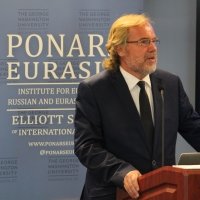An Alien in Moscow/An Alien in New York: The Cinema of Slava Tsukerman
Peter Rollberg, Professor of Slavic Languages, Film Studies and International Affairs, George Washington University
Overview
Slava Tsukerman "is one of the most original film artists of our time, and at the same time, he is, undeservedly, little known," argued Peter Rollberg, Professor of Slavic Languages, Film Studies and International Affairs, George Washington University, at a 31 January 2011 Kennan Institute discussion. Tsukerman is perhaps best known for his highly acclaimed film Liquid Sky, which has achieved cult status among certain cinema circles. In addition to providing general information about Tsukerman, Rollberg delved into the director's artistic and personal motivation for creating films like Liquid Sky and Perestroika, as well as their common focus on the concept of "alien" identity.
Rollberg began his lecture by providing background information on Tsukerman's life. Tsukerman was born in the Soviet Union and later immigrated to first Israel and then the United States; his experience of living as an immigrant in foreign countries had a large impact on his life and cinematic works. With respect to Perestroika, Rollberg noted that Tsukerman's world view was "characterized by a deep concern for the turn the world [was] taking" at the time the film was made - factors included the end of the Cold War, the collapse of the Soviet Union. The American social scene in the 1980s shaped Liquid Sky, which quickly became Tsukerman's coup de grace – after the film's release, "his name was quite recognizable in the 'indie' film scene," Rollberg explained. Tsukerman "went against all pressures, whether be it political or professional," according to Rollberg, and gained increasing popularity and respect for his expression of socio-political messages on the film screen.
The combination of Tsukerman's artistic creativity and personal experience—highlighted by what his understanding of growing social disconnect and political uncertainty—in conjunction with his use of computer graphics and special effects made him, according to Rollberg, "arguably the most intriguing [Russian-American] filmmaker." As Tsukerman was able to express his message on the screen through using new technology (such as in Liquid Sky) while doing so at very little financial cost, he explored his own creative license and created films that he enjoyed, without consideration to how audiences would receive his work. "Tsukerman, really, frustrates our viewing habits and makes us ‘listen up'," said Rollberg. Notwithstanding his interest in making films for himself, Tsukerman took long hiatuses from film-making, and waited nearly 25 years following the release of Liquid Sky to produce his next great, independent movie, Perestroika.
Like its predecessor, Perestroika was a combination of Tsukerman's feelings and personal experience, in this case, being an "immigrant." Tsukerman was originally an immigrant in the United States, when he first moved to New York, which Rollberg suggested may have created an initial feeling of disconnect—in other words, of being "alien"—for Tsukerman in New York's sprawling urban environment. He also likely felt "alien" in his native country of Russia, to which he returned after the collapse of the Soviet Union; Rollberg explained that because Tsukerman was neither American nor Russian—but had never truly been Soviet either—the filmmaker felt compelled to ask himself, "who am I?" Through the main character in Perestroika, a scientist who also feels "alien" in his native country, the director largely tried to explore this question and the theme of being "alien", in the sense of existing without a real transferable or concrete identity.
In conclusion, Rollberg commented on Tsukerman's work, which he described as leaving "a very unique legacy ... he made films that only he could make." As Rollberg suggested, it is difficult to assess whether or not Tsukerman's films will transfer to future generations; when asked whether or not the filmmaker's work was lasting, Rollberg posed his own question in response, "What is lasting?" he asked, noting, "...cultural memory is a very slippery thing."
By Ross Oermann
Blair Ruble, Director, Kennan Institute
Speaker

Peter Rollberg
Hosted By

Kennan Institute
The Kennan Institute is the premier US center for advanced research on Russia and Eurasia and the oldest and largest regional program at the Woodrow Wilson International Center for Scholars. The Kennan Institute is committed to improving American understanding of Russia, Ukraine, Central Asia, the Caucasus, and the surrounding region though research and exchange. Read more
Thank you for your interest in this event. Please send any feedback or questions to our Events staff.










